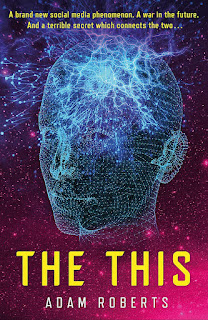We begin with a chapter located in the Buddhist inter-life concept of the Bardo (I had to look that up), then get a chapter that’s half made up of footnotes that form a kind of electronic stream of consciousness, before getting into intertwined storylines from the near and more distant future. Linking all this (sort of) is what first seems to be a next-step social media system, called The This, but which increasingly facilitates humans becoming part of a hive mind - the Borg without the nasty bolt-on bits. As if all this isn’t enough for one relatively short novel, we also get one of Roberts’ favourite conceits, a riff on a classic SF book - I won't reveal which one, but this fits wonderfully with what has come before.
Underpinning all this is apparently the philosophy of Georg Wilhelm Friedrich Hegel. Roberts has form on this approach - his wonderful The Thing Itself makes use of the philosophy of Immanuel Kant - but there is a big difference in the way it is done here. I learned all I knew about Kant and Hegel before reading Roberts' books from Monty Python's Philosopher's Song, but in The Thing Itself, some of Kant's ideas are expounded by the characters, so the reader knows what's going on. Here, no one ever mentions Hegel and so concepts of subject and object equivalence, absolute idealism and Spirit are flung about without knowing what to do with them.
I think it is excellent when fiction incorporates cultural references that are only picked up by those who are in the know. A recent episode of the fluffy daytime detective TV show Shakespeare and Hathaway began with a body being found in a near perfect reproduction of Millais' Ophelia painting - and if you knew the painting it provided a little thrill - an Easter egg in gaming terms. But the trouble here is that Hegel's ideas aren't just a little bonus for the cognoscenti, they are essential to pull the threads of the book together. I'd also say that where Kant's philosophy could be seen as fairly scientific, Hegel's seems more of a theological schema - and as such is perhaps not quite as good a fit with science fiction.
This is all intensely clever: I kept pausing to admire what Roberts was doing. But both the fragmented nature of the storytelling and the absence of likeable characters make it a book that’s difficult to truly enjoy. I am very glad I did read it - there’s so much in there – but I prefer a little more of a conventional structure (just as I far prefer Brunner’s Shockwave Rider to either Stand or Sheep). Even so, The This can't be faulted on either in its deluge of ideas or Roberts' bravura: it is a significant achievement.
| Hardback: |
| Bookshop.org |




Review by Brian Clegg - See all of Brian's online articles or subscribe to a weekly digest for free here


Comments
Post a Comment